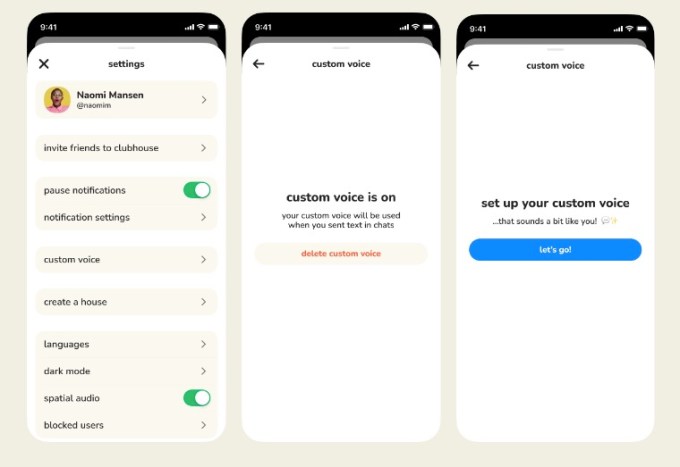Clubhouse, the once-popular live audio app, today announced users can now text their friends, and they’ll hear those texts in the sender’s custom voice.
To stay relevant amid user drop-off, Clubhouse debuted group voice chats where members can send asynchronous voice messages to each other, and they would appear in a format like Instagram Stories.
With today’s announcement, the company is acknowledging that you might not be in a situation to send voice messages to each other. So you can train your custom voice, send texts, and your friends would hear the message in the recreated voice. The app shows an indicator to your friends when the AI voice is reading out a message.

Image Credits: Clubhouse
In a blog post, the company said this feature still retains the feeling of being in a real-time chat with a friend.
“Imagine you text a friend, but on the other end they hear your words as if you actually said them. Your custom voice makes talking and typing or reading and listening all feel seamless, so you never lose that feeling of being in a live conversation,” the company said.
Clubhouse claims its AI is able to recreate your voice close to the original even when you train it by reading just a few phrases. The company said the AI can’t recreate your laughter well (so maybe don’t type hahaha?).

Image Credits: Clubhouse
The company can also generate a voice on its own if you are not comfortable recording your voice. The startup didn’t specify any details, but it would be likely a text-to-speech model.
Currently, this feature is only available in the U.S. at the moment.
The app’s usage has dwindled in the last few years. It last raised a round at a reportedly $4 billion valuation. In the last few years, it has had several layoffs. But last year, the company claimed to have a few years of runway left. Now it’s experimenting with AI-powered features to make conversations between friends easier, hoping that the users would stick around.
Notably, last year, Apple released a feature called Personal Voice, which creates a voice that sounds like you. This is particularly useful for people who may be at risk of losing their vocal speaking ability from conditions like ALS.



![[CITYPNG.COM]White Google Play PlayStore Logo – 1500×1500](https://startupnews.fyi/wp-content/uploads/2025/08/CITYPNG.COMWhite-Google-Play-PlayStore-Logo-1500x1500-1-630x630.png)